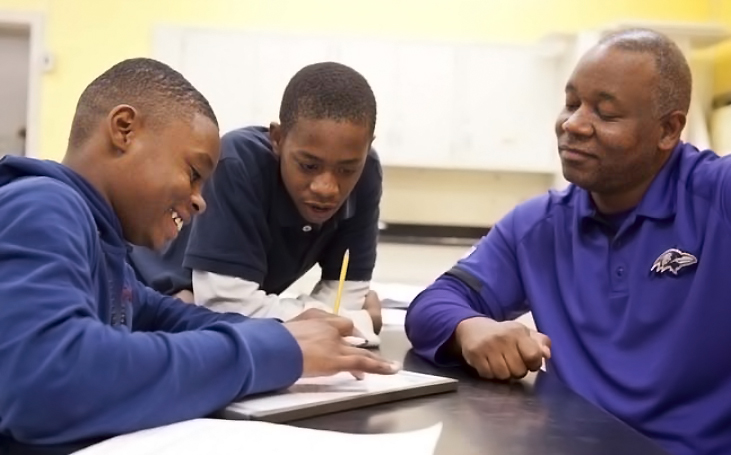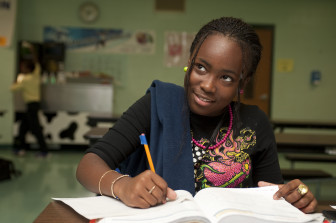
Higher Achievement
Higher Achievement provides intensive academic enrichment to middle-school students in Washington, Baltimore, Pittsburgh and Richmond, Va. It also has a strong commitment to developing its staff. Here, a mentor works with students in Baltimore.
Academic rigor is the name of the game at Higher Achievement, an after-school and summer program based in Washington, D.C., and serving 1,000 kids in four cities.
Three days a week during the school year, from 3:30 p.m. to 8 p.m., it provides an academic boost to low-income middle-school kids in 16 schools, using mentoring and teaching.
The organization recently turned its spotlight on itself, and took the unusual step of hiring a writing coach for its own staff.
Why?
“I noticed year after year that our direct service staff — when they looked to grow in their careers — they couldn’t make that next step,” said Chief Executive Officer Lynsey Wood Jeffries. “Their writing skills were weak.”
On an employee survey, staff members themselves had expressed an interest in improving their writing abilities.
The direct service staff at Higher Achievement are the directors and assistant directors of the learning centers located in schools.
All are college graduates. Center directors may have four to five years of work experience after college and some are former teachers, Jeffries said.
Assistant directors have about two years of experience after college, she said.
Jeffries said she was impressed at how they wanted to “lean in and get better.”
The organization hired a writing coach who worked individually with 10 staff members. The coach also created a webinar and short writing guide for the entire staff, Communications Director Jackie Ross said.

Higher Achievement
“Talent is everywhere, but opportunity is not,” reads the mission statement of Higher Achievement. The organization seeks to provide opportunity and a culture of high expectations for kids and to prepare then for success in college. Here, a middle-school student, Shameirra, works on a lesson.
“Too often, after-school providers and education providers tend to focus totally on our scholars,” Ross said. But at Higher Achievement “we want to make sure our staff is getting the support they need.”
Ross also thinks the instruction could inspire other organizations to do one-on-one coaching.
Higher Achievement paid about $10,000 for the writing instruction, Jeffries said.
“It paid a dividend that exceeded the cost of training,” she said. For one thing, it improved the organization’s fund-raising ability.
Foundations that fund nonprofits see a big need for improving the communication skills of nonprofit staff.
Louise Milone, regional training specialist with the Foundation Center in Atlanta, said she is “constantly stunned” by the fact that many people working in the nonprofit field can’t write grammatically.
It’s very difficult for employees to pitch their organization when their verbal and written communication skills are not strong, she said.
“You need to be able to speak well … to pitch your program,” she said. It’s an issue of credibility for the organization.
Higher Achievement is a midsize nonprofit with a budget of $7 million, Jeffries said. Professional development is a priority.
Some smaller nonprofits may find it harder to invest in staff development, Jeffries said, because all their resources are focused on doing their work.
She encourages them, however, to look for donated services.
For example, Higher Achievement, which bought a new building last year, received $700,000 in pro bono services last year, including lawyers and consultants, Jeffries said.
“We do partnerships in a very deep way,” she said.
Free staff development opportunities can be available.
For example, Lita Pardi, senior program officer at the Community Foundation for Greater Atlanta, said her organizations offers scholarships in various areas of professional development, including scholarships for improving writing and communication.
Not many people apply for the writing and communications scholarships, she said.
Sometimes the culture of a nonprofit makes a difference in staff members’ willingness to seek training.
At Higher Achievement, one of the core principles is about being open to seeing what’s needed for growth and improvement, Jeffries said.
The mission of Higher Achievement is to close the opportunity gap for kids.
“We believe everyone has talent,” Jeffries said, and Higher Achievement seeks to connect talent with opportunity. “Talent is everywhere, but opportunity is not,” reads the organization’s vision statement.
Its focus on staff training fits with its mission.
“We want to make sure we can walk the walk,” Jeffries said.





























